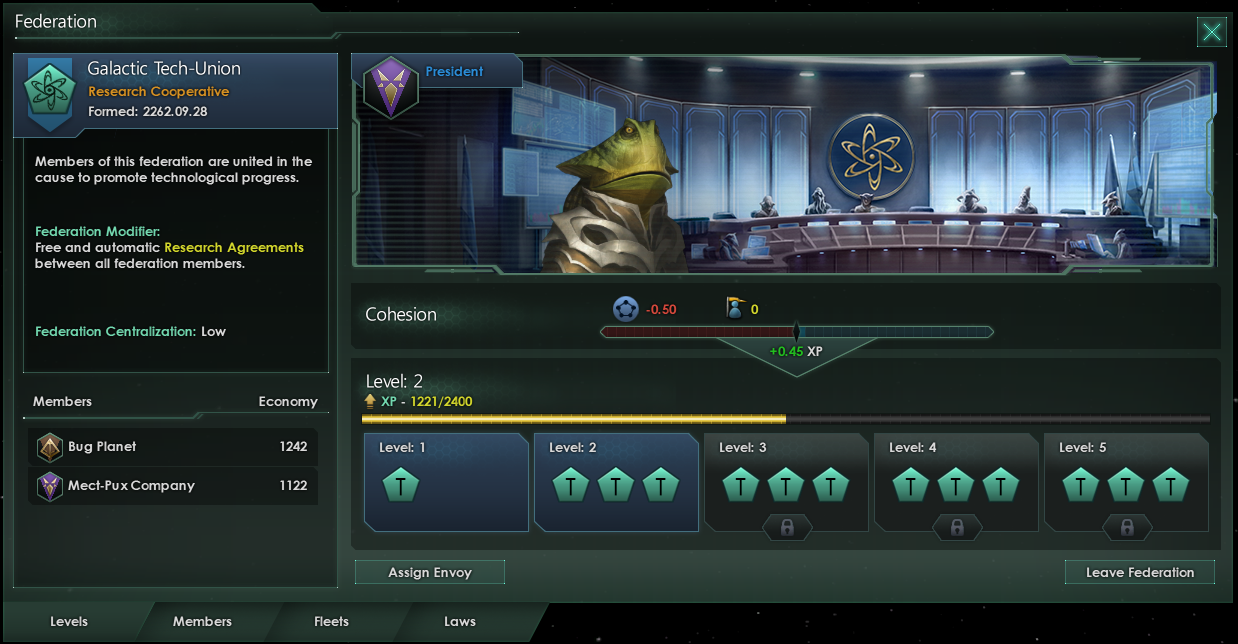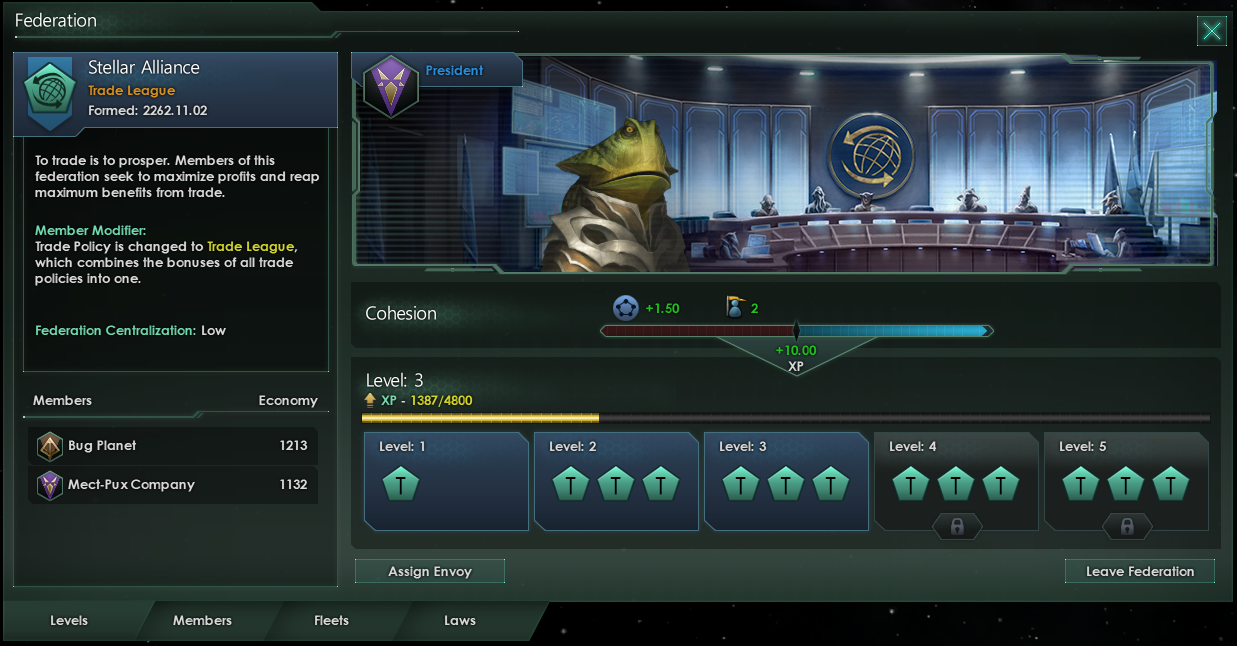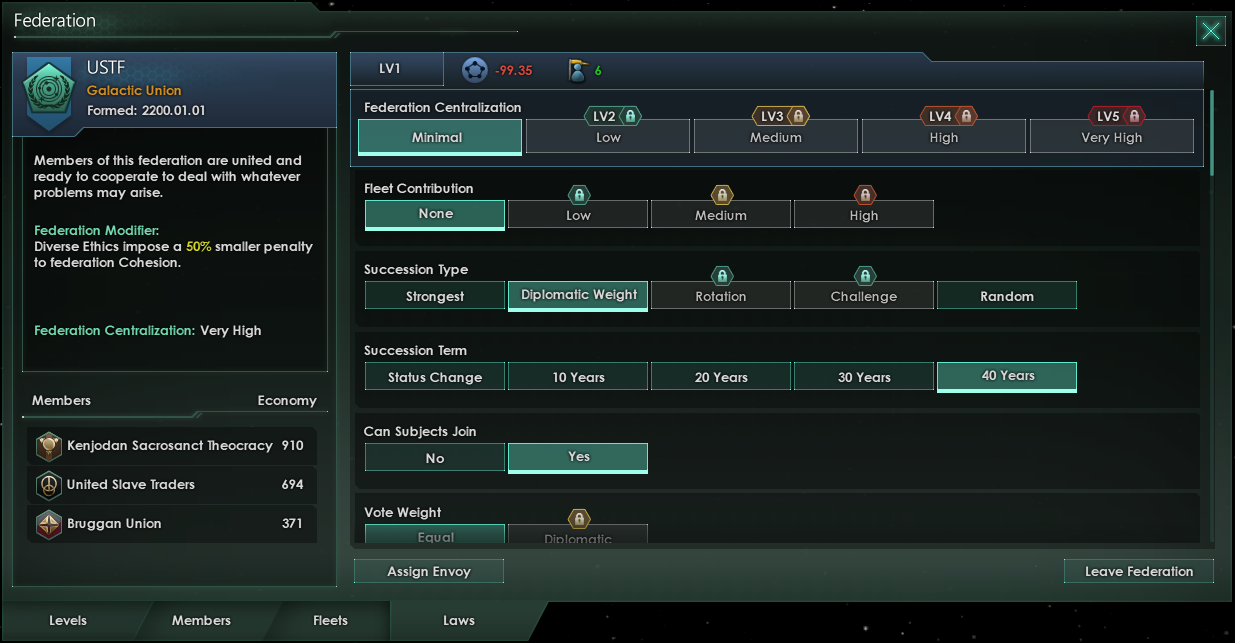Hello everyone!
It was great to finally reveal what we’re working on at PDXCON, and today we’re back with yet another dev diary where we will dive into some more details on the reworked federations.
The screenshots still feature a bunch of work-in-progress stuff, like every federation perk using a placeholder right now. Numbers and effects aren’t necessarily final either.
Federation Types
Like we mentioned at PDXCON, federation will now come in different Federation Types. Each federation type has a unique passive effect and can unlock federation perks as they level up.
It was great to finally reveal what we’re working on at PDXCON, and today we’re back with yet another dev diary where we will dive into some more details on the reworked federations.
The screenshots still feature a bunch of work-in-progress stuff, like every federation perk using a placeholder right now. Numbers and effects aren’t necessarily final either.
Federation Types
Like we mentioned at PDXCON, federation will now come in different Federation Types. Each federation type has a unique passive effect and can unlock federation perks as they level up.

Certain federation types have requirements on what type of empire can suggest to form them, but there are no limitations on who can join a federation (except for killer empires & inward perfection). Yes, this also means that Barbaric Despoilers and Criminal Syndicate are no longer excluded.
Galactic Union
This will be a more generic type of federation that will fit most groups of empires. This federation makes it easier to cooperate with empires, as diversity of ethics will have a less negative impact on maintaining cohesion. This federation type will be available to everyone in the free patch.
This will be a more generic type of federation that will fit most groups of empires. This federation makes it easier to cooperate with empires, as diversity of ethics will have a less negative impact on maintaining cohesion. This federation type will be available to everyone in the free patch.

Fleet bonuses a plenty!
Martial Alliance
This federation type is focused around having a very large and powerful federation fleet. Only militarists can suggest to form this federation.
This federation type is focused around having a very large and powerful federation fleet. Only militarists can suggest to form this federation.

Free and automatic research sharing!
Research Cooperative
Empires who wish to cooperate in achieving technological mastery should join together in a research cooperative. Only materialists can suggest to form a research cooperative.
Empires who wish to cooperate in achieving technological mastery should join together in a research cooperative. Only materialists can suggest to form a research cooperative.


New trade policy!
Trade League
If trade value is the focus of your empire, the Trade League is probably a very good federation for you to be a part of. The Trade League gets access to a new Trade Policy which combines the bonuses of all other trade policies. An empire needs to be a Megacorporation or have the Merchant Guilds civic in order to be able to suggest to form a trade league.

Did you know there is an Origin that lets you start as the president of a Hegemony?
Hegemony
This federation type is built around one strong core member. The president gets most of the bonuses, but the bonuses for the members are also quite powerful. Only authoritarian empires may suggest to form a hegemony.
Federation Perks
Federations will get access to new perks when they level up, and the perks they get access to depend on their type. There are usually 2 perks that gives bonuses to every member and 1 perk that gives bonuses only to the president. However, the Hegemony flips this around by giving the president 2 perks and the members 1 perk (which does not benefit the president in this case!).

Hegemony member perk.

President gets an additional Envoy.
Each time a federation levels up, they will get access to 3 new perks.
Level Up & Cohesion
In order to level gain XP, a federation needs to have positive Cohesion. The amount of XP a federation gains (or loses!) per month is directly tied to its Cohesion, which is a value that ranged from -100 to +100.

There are a number of things that will reduce Cohesion every month, such as every member, diverse ethics and opposing ethics. Federation members can counteract this by assigning Envoys to the federation, which will increase monthly Cohesion.
When Cohesion is at +100, the federation will gain +10 XP every month. If a federation loses XP and drops a level, they will lose access to their perks after a few months.
Federation Laws
It is possible for federations to customize some aspects of its rules. In some cases, federation types also have access to different laws at different points. A Research Cooperative can never have the highest level of fleet contribution, and they also require higher centralization to increase their Fleet Contribution.
Each federation type will start with a certain set of default laws.

There are a number of laws which define certain rules for the federation.
Centralization
Many federation laws require federation centralization to be high enough. To increase centralization, a federation needs higher level. In fact, centralization is the only law locked behind federation levels right now.
Increasing centralization isn’t always easy though, as doing so will have a large negative impact on Cohesion. That means more Envoys will need to be assigned to the federation to maintain its Cohesion.
The primary reason to increase centralization is to unlock new laws.

The Galactic Union federation type requires Medium centralization to have a 20% Fleet Contribution.
Fleet Contribution
Most federations will not start with the ability to build a federation fleet, as their fleet contribution will start on “None”. The Martial Alliance and the Hegemony do start with a “Low” fleet contribution, however. The Martial Alliance is also able to change its fleet contribution law to “High” as early as Medium centralization.

Most of the other laws not visible earlier.
Succession types
As you could see in previous screenshots there are a bunch of different laws for how federations can decide who becomes the president. Strongest is the empire with the greatest economy. Diplomatic Weight is the empire with the largest Diplomatic Weight (we talked about that at PDXCON, but more on that later). Rotation will rotate the president. Random will choose a president from a random member. Challenge succession type allows you to pick a challenge type for your federation.

Perhaps we’ll have enough psi-capable pops next time...
There are currently two different challenge types:
Psionic Battle lets psionic pops battle it out over which empire should be president.
Arena Combat lets the rulers of competing empires battle it out. Certain traits for the ruler (both species and ruler-specific) will influence how large chance the ruler has at winning. The Chosen will of course be very hard to beat.
----
That’s it for this week, and we hope you survive the information overload! We realized there are so many details we possibly could share, but this should cover the most important parts.
Next week we will be talking about the Galactic Community, Resolutions and more!

